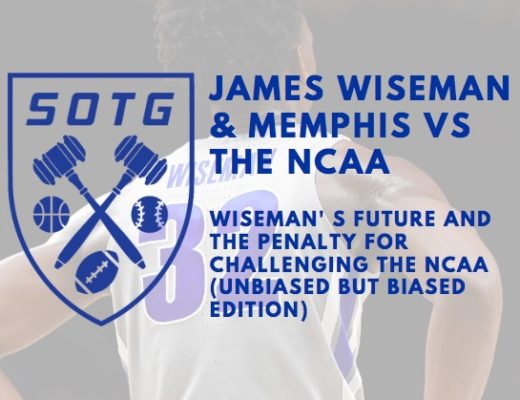Skating Around the Lanham Act in Iancu v. Brunetti
Mark Edward Blankenship Jr.[1]
For the first time, skateboarding will appear as a sport in the Tokyo 2020 Olympic Games.[2] As a result, many skateboarding apparel companies, such as Vans, Supreme, Volcom, and others that grew a following in the skateboarding scene years back may witness their trademarks gaining more exposure in the newly recognized Olympic sport. However, one skateboarding apparel company, recently gained exposure in a Supreme Court decision this past summer, two years after Matal v. Tam held that barring trademark registration under the Lanham Act for “disparaging marks” was viewpoint discrimination, and thus unconstitutional under the First Amendment.[3]
Introducing FUCT (Friends U Can’t Trust), a clothing company founded in 1990 by Erik Brunetti, with the help of professional skateboarder Natas Kaupas.[4] Unlike in Matal v. Tam, where The Slants decided on their name in order to promote racial pride and to convert the racial stereotype into something positive,[5] FUCT did not have much of a backstory. Instead, Brunetti essentially chose the name because of its phonetics. He wanted to make it look “corporate” and have people “question the pronunciation of it when they looked at the logo.”[6] Thus, the name itself became as much of a gag as something from a 2000s comedic movie plot, like the South Harmon Institute of Technology from Accepted,[7] the Delta Iota Kappa fraternity in National Lampoon’s Van Wilder,[8] or the Film Actor’s Guild from Team America: World Police.[9] However, with its logo flips of well-known graphic designs from Ford, Fila, and others, appropriations of pop-culture references, and its choice of subversive messages, the brand managed to carry an anti-establishment attitude that attracted followers, including bands like Nirvana and Rage Against the Machine.[10]

Yet FUCT also heavily attracted bootleggers who would sell knockoffs of Brunetti’s brand over the Internet. For years, Brunetti had been unsuccessful in obtaining a federal trademark for his brand, because one of the rules the Lanham Act of 1946 sets out for the USPTO is that trademarks are prohibited if they “[consist] of immoral, deceptive, or scandalous matter; or matter which may disparage or falsely suggest a connection with persons, living or dead, institutions, beliefs, or national symbols, or bring them into contempt, or disrepute.”[11] This same immoral/scandalous provision was also an issue for the Washington Redskins football team when registering their trademark.[12]

The Supreme Court eventually agreed to hear Brunetti’s case to determine (a) whether the implied word from FUCT would be considered scandalous to the clothing line’s target audience of young adults and (b) whether people outside of this demographic may consider it inappropriate speech.[13] The majority of the court held that the Lanham Act’s “immoral or scandalous” provision was substantially overbroad and violated Brunetti’s free speech rights. As Kagan put it, “There are a great many immoral and scandalous ideas in the world (even more than there are swearwords), and the Lanham Act covers them all. It therefore violates the First Amendment.”[14]
While many saw the Court’s opinion as a victory for First Amendment speech, some viewed this as a “FUCT” up mess.[15] The other justices seemed to view FUCT as nothing more than the type of crass and repulsive novelty apparel one may find at a Spencer’s Gifts store.[16] Even though Alito wrote in his concurring opinion that moral relativism was not the basis for the court’s opinion, he did suggest adopting a narrower interpretation of the statute that “precludes the registration of marks containing vulgar terms that play no real part in the expression of ideas.”[17] Under his proposal, the counter-cultural persona of FUCT, which did not develop until after the brand’s conception, would not be enough to acquire registration. As Alito stated, “The term suggested by that mark is not needed to express any idea and, in fact, as commonly used today, generally signifies nothing except emotion and a severely limited vocabulary. The registration of such marks serves only to further coarsen our popular culture.”[18] The other dissenting justices all agreed upon a narrower interpretation of some sort.[19] Sotomayor believed that the word was irrelevant with the brand’s relationship to sell clothes[20] and that as a result of the majority’s holding, “the government will have no statutory basis to refuse (and thus no choice but to begin) registering marks containing the most vulgar, profane, or obscene words and images imaginable.”[21] But overall, it is uncertain in determining whether the majority truly skated on thin ice in this case.
Images provided by:
solexlife, licensed under CC BY-SA 2.0
Public Domain, under CC0 Images
邹军 赖, licensed under CC BY-SA 2.0
Jamiecat *, licensed under CC BY-SA 2.0
david_hwang, licensed under CC BY-SA 2.0
Tim Sackton, licensed under CC BY-SA 2.0
watts_photos,
licensed under CC BY 2.0
[1] Juris Doctor, The University of Kentucky College of Law (2019).
[2] IOC Approves Five New Sports For Olympic Games Tokyo 2020, Olympic Games (Aug. 3, 2016), https://www.olympic.org/news/ioc-approves-five-new-sports-for-olympic-games-tokyo-2020
[3] Matal v. Tam, 137 S. Ct. 1744 (2017); Mark Sommers & Patrick J. Rodgers, Iancu v. Brunetti: Words Not Said, Said Most, Westlaw J. Intell. Prop. (May 22, 2019), https://www.finnegan.com/en/insights/iancu-v-brunetti-words-not-said-said-most.html; Samuel Hine, How O.G. Streetwear Brand FUCT Took a Free Speech Case All the Way to the Supreme Court, GQ (Jan. 30, 2019), https://www.gq.com/story/fuct-erik-brunetti-supreme-court-case.
[4] Hine, supra note 3; see also Ian Michna, Discussing The History Of FUCT & the Current Streetwear Market, Jenkem (May 23, 2019), http://www.jenkemmag.com/home/2019/05/23/discussing-history-fuct-current-streetwear-market/.
[5] Tam, 137 S. Ct. at 1747; see also Bill Chappell, The Slants Win Supreme Court Battle Over Band’s Name In Trademark Dispute, NPR (June 19, 2017, 10:29 AM ET), https://www.npr.org/sections/thetwo-way/2017/06/19/533514196/the-slants-win-supreme-court-battle-over-bands-name-in-trademark-dispute.
[6] Hine, supra note 3; Michna, supra note 4; Marc Richardson, Don’t Give A FUCT: A History of Upending The Status Quo, Grailed (June 7, 2018), https://www.grailed.com/drycleanonly/fuct-history.
[7] See e.g. Accepted (Universal Pictures 2006).
[8] See e.g. Van Wilder (Myriad Pictures 2002).
[9] See e.g. Team America: World Police (Paramount Pictures 2004).
[10] Richardson, supra note 6; Rage Against the Machine – Bullet in the Head [SJB Version], YouTube (Nov. 18, 2008), https://www.youtube.com/watch?v=I6zyIrVq1_E; Hine, supra note 3.
[11] 15 U.S.C. § 1052; Mariam Morshedi, Iancu v. Brunetti (Decision June 24, 2019), Subscript L. (June 25, 2019), https://www.subscriptlaw.com/blog/iancu-v-brunetti.
[12] See generally Doori Song, Blackhorse’s Last Stand?: The First Amendment Battle Against the Washington “Redskins” Trademark After Matal v. Tam, 19 Wake Forest J. Bus. & Intell. Prop. L. 173 (2019); Hammad Rasul, The Washington Redskins’ Deflating Hope: The Lanham Act Survives the First Amendment Challenge, 26 Marq. Sports L. Rev. 159 (2015).
[13] Iancu v. Brunetti, 139 S. Ct. 2294, 2296–97 (2019); Nina Totenberg, Supreme Court Dances Around The F-Word with Real Potential Financial Consequences, NPR (April 16, 2019, 5:00 AM ET), https://www.npr.org/2019/04/16/713632552/supreme-court-dances-around-the-f-word-with-real-potential-financial-consequence.
[14] Brunetti, 139 S. Ct. at 2296–97, 2302.
[15] Totenberg, supra note 13; Hine, supra note 3.
[16] Compare FUCT, Instagram, https://www.instagram.com/fuct/ (last visited Aug. 22, 2019) with Spencer’s, Instagram, https://www.instagram.com/spencers/ (last visited Aug. 22, 2019).
[17] Brunetti, 139 S. Ct. at 2303.
[18] Id.
[19] Instead of having Congress revise the provision to preclude the registration for vulgar terms, the dissenting justices all suggested “a reading of the statute separating the interpretations of “immoral” and “scandalous” and narrowing the construction of “scandalous” to just those marks that could be considered vulgar or obscene.” See Vincenc Feliu, The F Word – An Early Empirical Study of Trademark Registration of Scandalous and Immoral Marks in the Aftermath of the In Re Brunetti Decision, 18 J. Marshall Rev. Intell. Prop. L. 404, 419 n.109 (2019); Morshedi, supra note 11.
[20] Transcript of Oral Argument at 11, 47, Iancu v. Brunetti, 139 S. Ct. 2294 (No. 18-302).
[21] Brunetti, 139 S. Ct. at 2308; see also Feliu, supra note 19, at 420.





